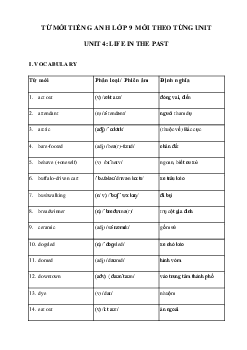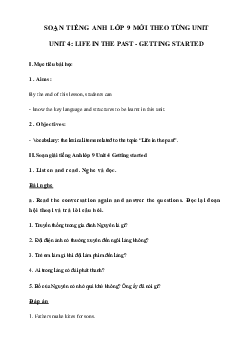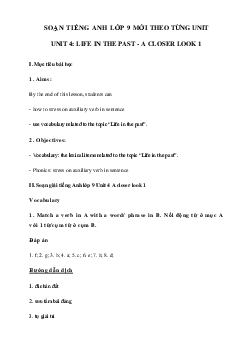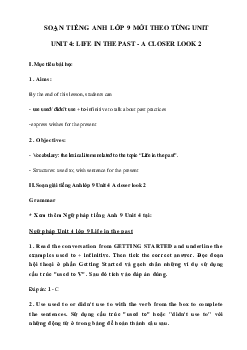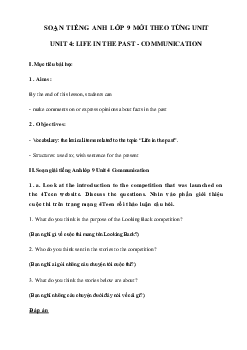





Preview text:
SOẠN TIẾNG ANH LỚP 9 MỚI THEO TỪNG UNIT
UNIT 4: LIFE IN THE PAST - LOOKING BACK
I. Mục tiêu bài học 1. Aims:
By the end of this lesson, students can
- review all what they have learnt in this unit. 2. Objectives:
- Vocabulary: the lexical items related to the topic “Life in the past”.
- Structures: used to/ didn't use to; wish sentences
II. Soạn giải tiếng Anh lớp 9 Unit 4 Looking back Vocabulary
1. Choose the best answer A, B, or C to complete the sentences. Ch ọn
đáp án A, B hoặc C để hoàn thành câu. Đáp án
1 - B; 2 - A; 3 - C; 4 - A; 5 - B;
Lời giải chi tiết
1. The children in my home village used to go bare-footed, even in winter. Now they all have shoes.
(Những đứa trẻ ở làng quê tôi thường đi chân trần, ngay cả mùa đông. Bây giờ họ đều đi giày.)
2. There is usually a generation gap gap between the old and the young, especially when
the world is changing so fast.
(Thường có khoảng cách giữa các thế hệ người già và người trẻ, đặc biệt là khi thế giới thay đổi quá nhanh.)
3. Every nation has respect for their long-preserved tradition.
(Mọi quốc gia đều tôn trọng truyền thống lâu đời.)
4. In Viet Nam, seniority often refers to age and social position, not to wealth.
(Ở Việt Nam, thâm niên thường đề cập đến tuổi tác và vị thế xã hôi, chứ không phải sự giàu có.)
5. Giving lucky money to the young and the old at Tet is a common practice in many Asian countries.
(Tặng tiền lì xì cho trẻ em và người già vào dịp Tết là một hành động phổ biến ở nhiều nước Châu Á.)
2. a. Match the verbs in A with their definitions in B. N ối những động
từ ở cột A với các định nghĩa ở cột B. Đáp án 1. b; 2. e; 3. a; 4. c; 5. d Hướng dẫn dịch 1. diễn - đóng vai
2. bảo tồn - giữ sự sống 3. sưu tầm - gom lại
4. giải trí - mang lại niềm vui
5. chết dần, lỗi thời - không còn tồn tại
b. Use the verbs in A in their correct forms to complete the sentences.
Sử dụng các đ ộng từ ở cột A theo dạng đúng của nó để hoàn thành câu. Đáp án 1. acting out 2. die out 3. preserve 4. collecting 5. entertains Hướng dẫn dịch
1. Small children like listening to and acting out stories.
(Trẻ nhỏ thích l ắng nghe và diễn những câu chuyện.)
Giải thích: act out (di ễn)
2. Hand-writing a letter is a pastime that is beginning to die out. I'm already beginning to miss it.
(Viết thư tay trong quá kh ứ đang bắt đầu mất đi. Tôi đã b ắt đầu nhớ nó.)
Giải thích: die out (bi ến mất)
3. Should we try to preserve every custom or tradition which is in danger of dying out?
(Chúng ta có nên cố gắng giữ gìn mọi phong tục hoặc truyền thống đang có
nguy cơ biến mất không?)
Giải thích: preserve (b ảo tổn)
4. He's collecting data for his book Values in the Past.
(Anh ấy đang thu thập dữ liệu cho cuốn sách "Giá tr ị của quá khứ".)
Giải thích: collect (thu th ập)
5. She often entertains her children by telling them stories and acting them out.
(Cô ấy thường giải trí cho con mình bằng cách kể cho chúng nghe những
câu chuyện và diễn chúng.)
Giải thích: entertains (gi ải trí) Grammar
3. Write true sentences about the practice of following things in the
past, using used to and didn't use to. Vi ết câu đúng s ử dụng cấu trúc
"used to" và "didn't use to". Đáp án
1. Men used to be the bread winner of the family.
2. Women didn't use to go to work.
3. People didn't use to travel on holiday.
4. Families didn't use to be nuclear.
5. People used to make banh chung at Tet themselves.
6. Children used to play outdoor games.
4. Read these situations and write wishes want to make for them. Đ ọc
những tình huống sau và vi ết câu với cấu trúc "wish". Đáp án
1. I wish my village had access to clean piped water.
2. I wish there were a bridge over the river, so we did not have to cross the river by boat twice a day to school.
3. I wish there were an organisation for social activities for teenagers in my town.
4. I wish I were tall enough to play basketball.
5. I wish there were four seasons in my area.
5. Look at the picture and finish the boy's wishes. Nhìn vào b ức tranh
và hoàn thành điều ước của cậu bé. Đáp án
1 - I wish it would stop raining.
2 - I wish the wind weren't blowing so hard.
3 - I wish the sun were shining.
4 - I wish I were sitting in a warm house. Communication
6. Rearrange the sentences to make a meaningful conversation. S ắp xếp
lại đoạn hội thoại theo th ứ tự đúng. Đáp án
1 - 4 - 5 - 2 - 9 - 7 - 8 - 6 - 3
Lời giải chi tiết
Mai’s friend: Mai, are you going to the Tet flower market with us this afternoon?
(Mai, bạn sẽ đi chợ hoa Tết với chúng tôi chiều nay chứ?)
Mai: I'm sorry I can't. I'm making candied fruits.
(Tôi xin lỗi tôi không thể. Tôi đang làm mứt trái cây.)
Mai’s friend: Wow... That's time-consuming and it requires a lot of patience. My family buys it.
(Wow ... Việc này rất nhiều thời gian và nó đòi hỏi rất nhiều sự kiên nhẫn. Gia đình tôi thường mua nó.)
Mai: We used to. But this year my mother wants to bring back some traditions.
(Nhà tôi cũng thường mua. Nhưng năm nay mẹ tôi muốn mang lại một số truyền thống.) Mai’s friend: Why? (Tại sao?)
Mai: She said that if we didn't do it, our customs and traditions would die out.
(Mẹ nói rằng nếu chúng ta không làm điều đó, phong tục và truyền thống của chúng ta sẽ mất đi.)
Mai’s friend: Oh, I see. Can I join you?
(Ồ, tôi hiểu rồi. Tôi có thể tham gia với bạn được không?)
Mai: Certainly! And we can learn how to make banh chung too. My father will teach us.
(Chắc chắn rồi! Và chúng ta cũng có thể học cách làm bánh. Bố tôi sẽ dạy chúng ta.)
Mai’s friend: Interesting! I'll come.
(Thật hấp dẫn! Tôi sẽ đến.)
